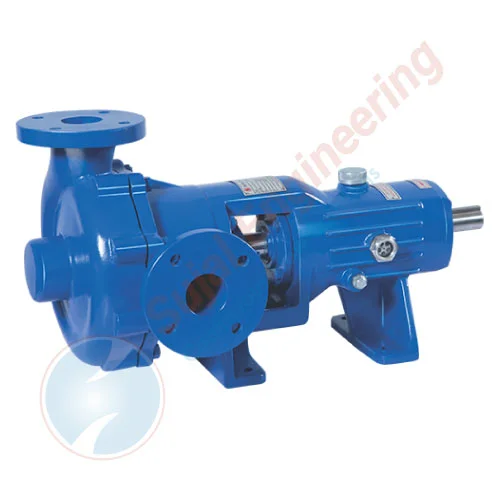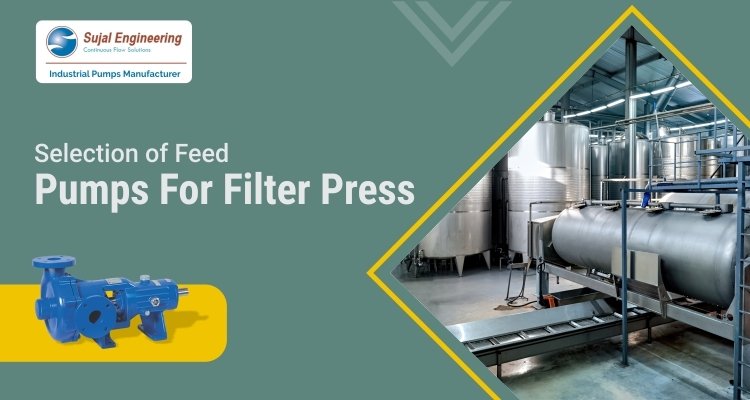Understanding Filter Press Feed Pumps: An In-Depth Guide

If you’re in the business of industrial processing plants, you probably know that filter presses are commonly used for solid-liquid separation.
The press separates suspensions of solids and liquids into a filter cake and a filtrate. This filtration job is usually done by a filter press feed pump.
Without the proper feed pump setup, your filter press simply won’t work efficiently.
In this article, we’ll help you thoroughly understand what a filter press feed pump is, and the key factors to consider for selecting the right pump for your project.
What is a Filter Press Feed Pump?
The feed pump for a filter press is the machine that pumps the slurry from a holding tank into the filter press at a certain flow rate and pressure.
The feed pump creates the pressure needed to push the slurry through the filtering chambers in the press consistently and reliably.
Ideally, it has to generate enough pressure to overcome the resistance created as the filter cake forms on the plates or membranes.
Key Considerations for Filter Press Feed Pump Selection
Choosing the right feed pump for your filter press requires careful consideration.
Here are the major factors you need to consider for filter press feed pump selection:
1 — Pump Type
There are various types of pumps that can work as filter press feed pumps including centrifugal, progressive cavity, peristaltic, piston, diaphragm, gear, and screw pumps.
Centrifugal pumps like horizontal or vertical centrifugal are good choices for clean or low-viscosity slurries. Progressive cavity pumps can handle viscous or abrasive slurries.
Peristaltic hose pumps provide containment for corrosive slurries. Piston and diaphragm pumps allow the pumping of higher viscosity slurries. Gear and screw pumps can handle slurries with entrained solids.
So, you need to take a close look at your slurry properties and operating conditions to shortlist the most suitable pump types.
2 — Required Flow Rate
The pump flow rate must match the flow rate needs of your specific filter press. Pumps with too low flow will starve the filter press, reducing throughput. Pumps with too high a flow can overload the filter press.
This is why you must consider the size of your filter press, number of plates and chambers, size of diaphragms, and required cycle times when figuring out the optimal flow rate.
3 — Pump Head Pressure
The feed pump must overcome frictional losses in the piping system as well as back pressure from the filter press to deliver the slurry.
For this, you need to calculate the required pump head by looking at the vertical height of the press, pipe friction losses, and maximum operating pressure of your filter press. Plus, make sure to allow some extra headroom in your calculations.
Remember, centrifugal and positive displacement pumps have different pressure capabilities. So, make sure to select a pump type that can achieve the required pressure.
4 — Slurry Properties
Factors like slurry concentration, viscosity, specific gravity, and the presence of abrasives must be considered during your filter press feed pump selection.
For example, more viscous slurry will require higher pressure capability and viscosity tolerant designs such as air diaphragm, peristaltic hose, or progressive cavity pumps.
That means you need to determine the slurry corrosivity and choose a pump with compatible wetted parts like rubber, stainless steel, or glass-lined materials.
5 — Maintenance and Reliability Requirements
If your project involves handling harsh slurries, your pump will experience more wear and need frequent maintenance. In this case, you must opt for rugged designs with easily replaceable wear parts.
Low-maintenance pumps like air diaphragm or peristaltic types are a good choice.
More importantly, be sure to check the manufacturer’s serviceability recommendations — pumps like vertical centrifugal or progressive cavities may require removing piping or disassembly to service.
Conclusion
Selecting the best filter press feed pump requires digging into the details of flow rate needs, pressure requirements, slurry properties, and maintenance considerations.
So, it’s essential to take the time upfront to thoroughly evaluate your options.
That said, if you’re looking for the best filter press feed pump manufacturer, look no further than Sujal Pumps.
We’re industry experts with over 20 years of experience supplying top-quality, customized feed pumps optimized for any filter press application.
Our team works closely with every client to analyze their specific operating conditions and requirements to deliver the ideal feed pump solution.
From centrifugal and progressive cavities to diaphragm and peristaltic pumps, we offer a wide selection of pump types and customize each unit with the right metallurgy, seals, drives, and smart monitoring capabilities.





